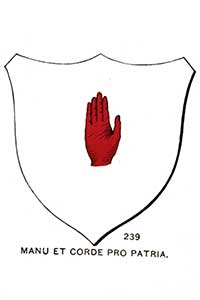The Brogan or Browne Family

(Crest No. 239. Plate 53.)
THE Brogan family is descended from Milesius, King of Spain, through the line of his son Heremon. The founder of the family was Maine, ancestor of the Southern Hy Nials, and son of Nial of the Nine Hostages, King of Ireland, A. D. 379. The ancient name was O’Hagan, signifying “The Pleader.” The possessions of the sept were located in the present Counties of Mayo and Cavan and Meath. O’Dugan mentions the O’Brogans as chiefs also on the same territory as O’Dunn and O’Dempsey, namely, in Kings and Queens Counties:
“The O’Brogans dwell in their towns,
The Clan Kenny and Clan Conor,
Their lands are well known to support
O’Dunn and O’Dempsey.”
Of the O’Brogan family who Anglicized the name to Browne, many won high distinction at home and in foreign service. One of them was Colonel en suite to the Regiment of Lally in the Irish Brigade in France, and accompanied Prince Charles in his expedition to Scotland. Colonel Browne saved the Prince’s rear guard on the march for Penrith, and signalized himself at the battle of Falkirk, the retreat from Derby, and other occasions. He was created a Chevalier of the Order of St. Louis by King Louis the Fifteenth of France. Another Colonel Browne, and a Major in Dillon’s Regiment, distinguished himself at the capture of Grenada, in the West Indies, by Admiral Count D’Estaing, in 1779, and was killed shortly after at the siege of Savannah, Ga. “He marched his regiment immediately to the attack,” writes Ferrar, “planted the French colors twice on the walls of Savannah, and in the third attempt was killed.” He was of the family of Moyne, in the County of Mayo. Other members of this family were distinguished in the Austrian service.
George, Count de Browne, born in Ireland in 1698, distinguished himself in the service of Russia against the Poles, Turks, and French. His life was one of constant adventure. He was three times taken prisoner, and was once sold as a slave. The Czar Peter the Third created him a Field Marshal and appointed him Governor of Livonia. After thirty years’ services the Empress Catherine refused to allow him to retire, so necessary did she deem his services. He died in his ninety-fourth year.
Patrick Browne, M. D., was a native of Mayo, where he was born in 1720. He was an intimate friend of Linnæus and other distinguished naturalists. He spent many years in the West Indies, and made collections of the flora and fauna of those islands. He published catalogues of the birds and fishes of Ireland, and other works on natural subjects.
Peter Browne, Protestant Bishop of Cork, born in the latter part of the seventeenth century, was a noted character in his day. He published a pamphlet which created a sensation, entitled “Against the Custom of Drinking to the Memory of the Dead.” It was in reality directed against those who were continually drinking to the memory of King William the Third. The Dutchman’s worshipers and the Orangemen down to a recent period were, accordingly, accustomed to add to the toast of William’s memory “in spite of the Bishop of Cork.” Bishop Browne was the author of many able works directed against Locke, Toland, and other anti-Christian writers, and is styled by Ware as “a man not unworthy of note in the philosophical annals of Ireland.”
Andrew Browne, a journalist, born in Ireland in 1744, emigrated to America, settled in Massachusetts, and fought on the American side at Lexington and Bunker Hill. In 1777 he was made Muster Master-General, and subsequently Major. After the close of the war he published the “Federal Gazette,” afterward changed to the “Philadelphia Gazette,” which was the organ of the friends of the Federal Constitution in addressing the public. Browne was the first to report the debates in Congress in his newspaper.
William Browne was born in Ireland in 1779, and having entered the United States mercantile marine, was impressed by a British warship in 1797. He subsequently entered the naval service of Buenos Ayres, defeated a Spanish fleet in 1815 off Martin-Garcia Island, captured Montevideo the following month, was raised to the rank of Admiral, and engaged in many successful expeditions against Spanish commerce in the Pacific. He also signalized himself in the war with Brazil.
The late John Ross Browne, traveler and author, was born in Ireland in 1822. His books of travel, illustrated by his own pencil, are among the most interesting of their kind. He also drew up valuable reports for the government on the mineral resources of the states and territories west of the Rocky Mountains. From 1868 to 1870 he was United States Minister to China.
The name is numerous in Ireland to-day, and in the United States and Canada. Judge Edward Browne of New York City, one of the ablest jurists and most respected members of the Bar in this State, is a descendant of this distinguished Irish family.
